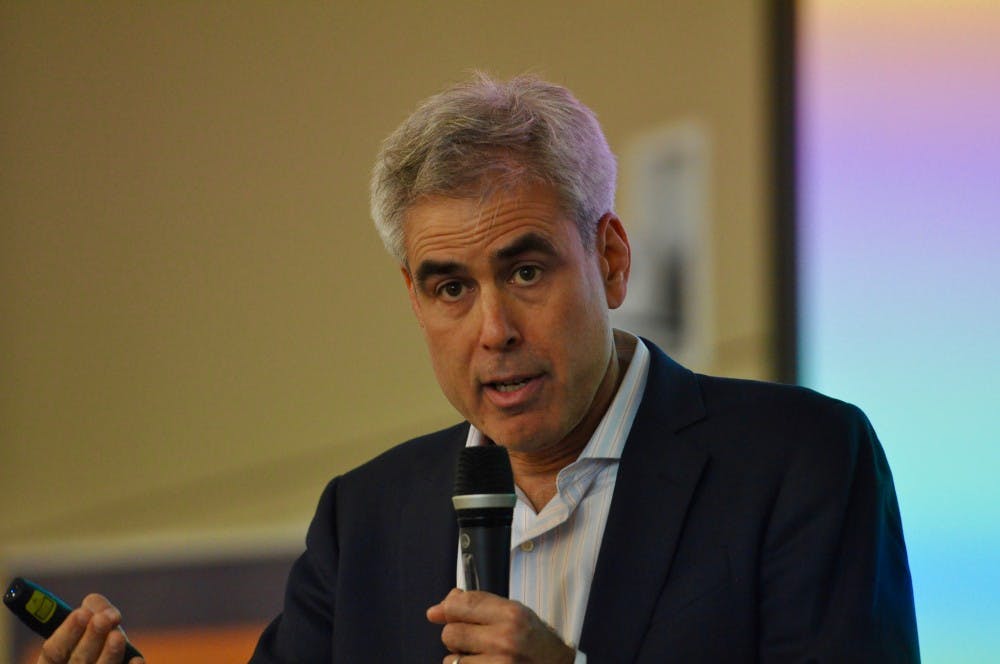Jonathan Haidt, social psychologist at New York University’s Stern School of Business, spoke about the usefulness of adversity and problems with the modern university climate on Thursday, Oct. 4.
“Talking about ideas that you find offensive or threatening in some way is hard but is essential,” Haidt said.
Haidt said in the past few years, a culture of “safe spaces” and “trigger warnings” developed on college campuses. Haidt said students believe they need protection from words, books and speakers because they think they are more fragile than they actually are.
According to Haidt, this belief emerged from multiple factors, including rising political polarization, increased rates of anxiety and depression and paranoid parenting.
“Every society has realized that children — and adults, too — need adversity to grow strong,” Haidt said. “We can’t reach maturity without adversity.”
Haidt said people are “anti-fragile” — meaning they become stronger through testing and stress.
Haidt used a study of infants who were either given peanut-containing food to eat or prevented from eating peanut-containing food altogether as an example of this concept. In the study, 14 percent of the children who were not exposed to peanuts developed a peanut allergy by age 5, while only 2 percent of the children in the other group developed an allergy by age 5.
The scientists concluded that by avoiding peanuts, they were increasing the likelihood of peanut allergies developing, therefore creating the problem they were trying to avoid. This was an example of the hygiene hypothesis.
“This is an example of how good intentions and bad ideas can damage kids and set them up for failure,” Haidt said.
Haidt said Alison Gopnik, psychology professor at the University of California Berkeley, found in her research on children’s play and risk that children in the past 20 years have developed “risk deprivation syndrome,” where they are unable to judge risk and face it.
“Trying to eliminate all such risks from children’s lives may be dangerous," Gopnik said, according to Haidt. "There may be a psychological analog to the hygiene hypothesis. In the same way, by shielding children from every possible risk, we may lead them to react with exaggerated fear to situations that aren’t risky at all and isolate them from the adult skills that they will one day have to master.”
Haidt said there has been a significant decline in recent years of adolescents who have had a driver’s license, have worked for pay, have dated and have tried alcohol, while there has been a sharp increase in rates of suicide and depression for the same age group.
Haidt said the current generation of college students is much more fragile than previous generations because they haven’t been able to learn how to be independent.
He said the term “microaggression” is useful for detecting covert racism, but it should not classify actions that are tactless remarks or actions that have no bad intentions. Haidt said the phrase “faux pas,” French for “false step,” is better to describe embarrassing actions that are not hostile in nature.
"When increasing diversity, let’s teach people to be more polite and give others the benefit of the doubt," Haidt said. “If it’s not clear that there was hostile intent, don’t treat it like there was hostile intent.”
Haidt recently released his new book “The Coddling of the American Mind: How Good Intentions and Bad Ideas Are Setting Up a Generation for Failure” with co-author Greg Lukianoff, president and CEO of the Foundation for Individual Rights in Education, in which he discusses these ideas in greater detail.
Do you like this story? The Plainsman doesn't accept money from tuition or student fees, and we don't charge a subscription fee. But you can donate to support The Plainsman.





